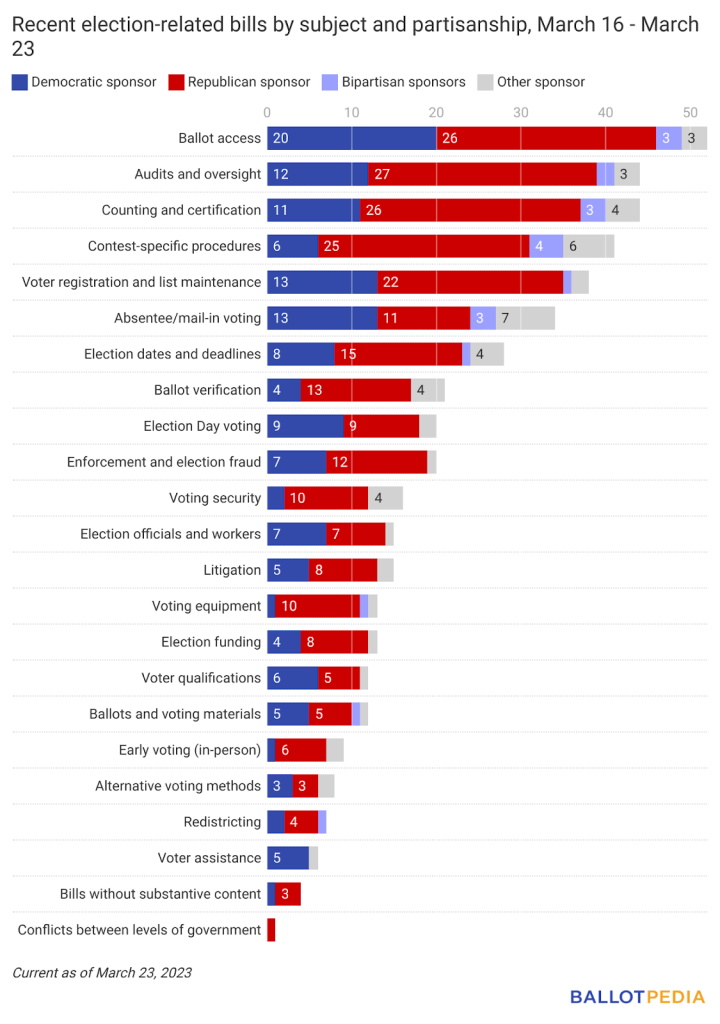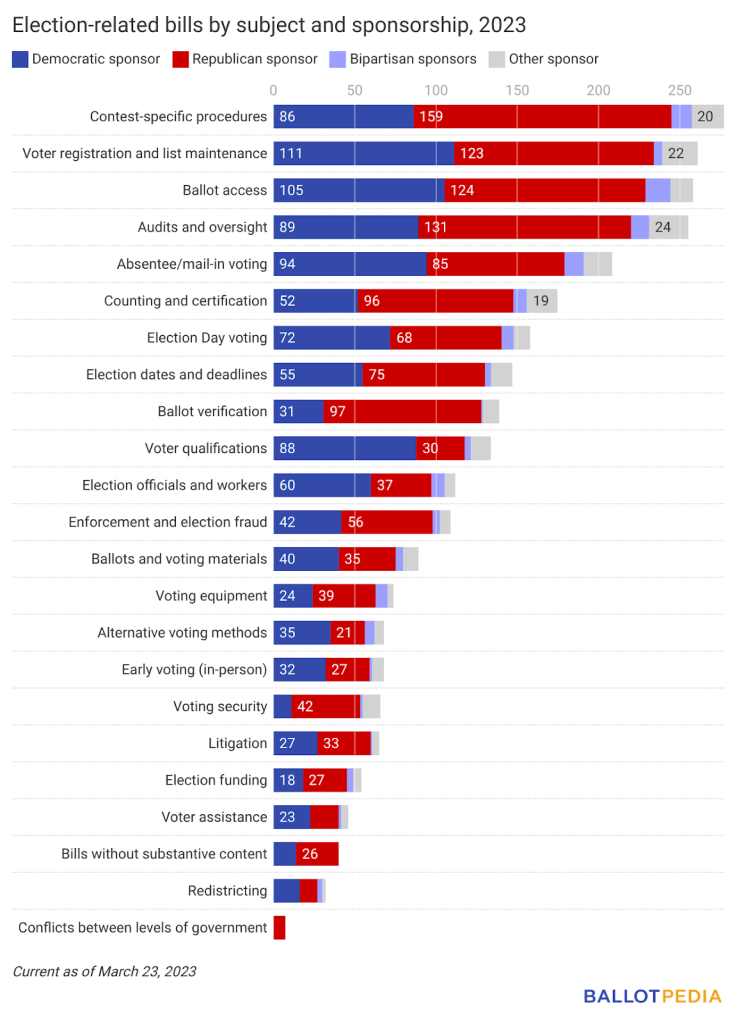Welcome to The Ballot Bulletin: Ballotpedia’s Weekly Digest on Election Administration. Every Friday, we deliver the latest updates on election policy around the country, including legislative activity, nationwide trends, and recent news.
In today’s issue, you’ll find:
- Legislative activity: About the bills acted on this week and a big-picture look at all the bills we have tracked this year.
- Recent news: Noteworthy developments in election policy at the federal, state, and local levels, including litigation and ballot measures.
Legislative activity
State legislatures acted on 351 election-related bills from March 16 to March 23, down from 379 bills the previous week.
Highlights:
- These 351 bills are 17.5% of the 2,005 election-related bills introduced in 2023. At this point in 2022, we were tracking 2,343 election-related bills in state legislatures, 16.9% more than this year.
- The bill topics with the most legislative activity this week were ballot access (52), audits and oversight (44), counting and certification (44), contest-specific procedures (41), and voter registration and list maintenance (38).
- Eighty-six (24.5%) of the bills with activity this week are in Democratic trifecta states, 222 (63.2%) are in Republican trifecta states, and 43 (12.3%) are in states with divided governments.
Notable developments
- Idaho Gov. Brad Little (R) signed HB0124 on March 16. The bill removes student IDs as acceptable proof of identity for voting purposes at polling places. So far this year, state legislators have introduced 99 voter ID bills, and two other states have enacted voter ID bills. Utah HB0448 requires a state or federally-issued photo ID to vote. Wyoming HB0079 makes concealed carry permits a valid form of voter identification. Democrats sponsored 16 of the 99 bills, while Republicans sponsored 75. State legislators introduced 144 voter ID bills in 2022, 12 of which were enacted. Democrats sponsored 14 of these bills, while Republicans sponsored 117. Thirty-seven states currently require some form of identification to vote. According to the Campus Vote Project, 12 states do not allow the use of a student ID as identification for voting.
- The North Dakota Legislature passed SB2292 on March 20. The bill, sponsored by Republican legislators, allows anyone except a candidate to serve as an election observer if the individual informs the election inspector of their intent. So far this year, legislators have introduced 25 other bills concerning poll observers, with Democrats sponsoring eight of these bills and Republicans sponsoring 14. In 2022, state legislators considered 50 bills on this topic, five of which were enacted. Democrats sponsored 14 of these bills, while Republicans sponsored 34.
Recent activity and status changes
Of all election-related bills in state legislatures in 2023:
- 20 have been enacted (+7 from last week)
- 46 passed both chambers (+8)
- 125 passed one chamber (+14)
- 67 advanced from committee (+5)
- 1,721 have been introduced (+81)
- 26 are dead (+1)

Enacted bills
States have enacted 20 election-related bills in 2023, 18.2% of the 110 bills states had enacted at this point in 2022. To see all bills enacted this year, click here.
Bills enacted since March 16, with their official titles, are below.
Idaho (Republican trifecta)
- ID H0124: Amends existing law to revise provisions regarding accepted voter identification at the polls.
North Carolina (Divided government)
- NC H88: Omnibus Local Elections
Bills that passed both chambers
Forty-six bills have passed both chambers in 2023, 90.2% of the 51 bills that had passed both chambers at this point in 2022. To see all bills that have currently passed both chambers, click here.
Active bills that passed both chambers since March. 16, with their official titles, are below.
Arkansas (Republican trifecta)
- AR HB1487: To Create The Ballot Security Act Of 2023; And To Amend Election Law Concerning The Handling Of Election Ballots.
Georgia (Republican trifecta)
- GA SB277: Screven County; board of elections and registration; create
- GA HB587: Rabun County; Board of Education; change description of districts
Hawaii (Democratic trifecta)
- HI HB130: Relating To Validation Of Ballots.
Indiana (Republican trifecta)
- IN SB0106: Local powers concerning elections.
Kentucky (Divided government)
- KY HB302: AN ACT relating to elections and declaring an emergency.
North Dakota (Republican trifecta)
- ND HB1192: Relating to electronic voting systems, electronic voting devices, absentee voting, and canvassing boards.
- ND SB2050: A political subdivision’s ability to establish a library without an election and local maintenance efforts of public libraries; and to provide an effective date.
- ND HB1293: Relating to election of city commissioners, city council members, and park district commissioners.
- ND SB2163: Relating to language on voting ballots.
- ND SB2292: Relating to election offenses and election observers; and to provide a penalty.
South Carolina (Republican trifecta)
- SC H3961: Dorchester School District 2
Tennessee (Republican trifecta)
- TN SB1541: AN ACT to amend Chapter 563 of the Acts of 1903; as amended by Chapter 64 of the Acts of 1907; Chapter 647 of the Private Acts of 1911; Chapter 158 of the Private Acts of 1915; Chapter 170 of the Private Acts of 1915; Chapter 3 of the Private Acts of 1917; Chapter 397 of the Private Acts of 1919; Chapter 23 of the Private Acts of 1919; Chapter 231 of the Private Acts of 1919; Chapter 764 of the Private Acts of 1927; Chapter 232 of the Private Acts of 1941; Chapter 669 of the Private Acts of 1947
Utah (Republican trifecta)
West Virginia (Republican trifecta)
- WV SB522: Allocating percentage of county excise taxes for funding improvements to election administration
Defeated bills
Twenty-six bills have been defeated in 2023, 14.9% of the 175 bills that were defeated at this point in 2022. To see all bills that have been defeated in 2023, click here.
Bills that were defeated in committee or by a floor vote since March 16, with their official titles, are below.
Tennessee (Republican trifecta)
- TN HB1045: AN ACT to amend Tennessee Code Annotated, Title 2, relative to political party registration.
Recent activity by topic and sponsorship
The chart below shows the topics of the bills state legislatures acted on since March 16. Click here to see a full list of bill categories and their definitions.

* Note: Contest-specific procedures refers to primary systems, municipal election procedures, recall elections, special election procedures, and other systems unique to a particular election type.
All 2023 bills by topic and sponsorship
The chart below shows the topics of a sample of the 2,005 bills we have tracked this year. Note that the sums of the numbers listed do not equal the total number of bills because some bills deal with multiple topics.

Recent activity by state and trifecta status
Of the 351 bills state legislators acted on this week:
- 86 are in Democratic trifectas
- 222 in Republican trifectas
- 43 are in divided governments.
The map below shows election-related bills acted on in the past week by state trifecta status.

All 2023 bills by state and trifecta status
The map below shows the number of election-related bills introduced by state in 2023 by state trifecta status.

Recent news
Pennsylvania court dismisses mail-in ballot lawsuit
On March 23, the Commonwealth Court of Pennsylvania dismissed a challenge to county election boards’ authority to correct mail-in ballots. Plaintiffs included the Republican National Committee, the National Republican Congressional Committee, and the Republican Party of Pennsylvania. The defendants were acting Secretary of State Al Schmidt (R), Bureau of Election Services and Notaries Director Jessica Mathis, and the boards of elections in all 67 Pennsylvania counties. The plaintiffs argued that county election boards lack the authority to correct mail-in ballots, because “[t]he Election Code tightly constrains what Boards may do with absentee and mail-in ballots once they receive them.” In yesterday’s court order, Judge Ellen Ceisler said “although the subject matter of this litigation implicates elections, both local and statewide, which are governed by the Election Code, all signs point to the County Boards falling under the designation of ‘political subdivision,’ suits against which are excluded from this Court’s original jurisdiction under Section 761(a)(1) of the Judicial Code.” The defendents have not indicated whether they plan to appeal the court’s decision.
Kansas appeals court reinstates election lawsuit
On March 17, the Kansas Court of Appeals reinstated a 2021 lawsuit challenging an election-related bill enacted in the state that year. Plaintiffs, including Loud Light, the League of Women Voters of Kansas, the Topeka Independent Living Resource Center, and the Kansas Appleseed Center for Law and Justice, alleged HB2183‘s signature matching requirements and ballot collection restrictions were unconstitutional. The Shawnee County District Court dismissed the lawsuit in April 2022. In the appeals court opinion, Judge Stephen Hill said the state must “show that the statute can overcome strict scrutiny.” He said, “Because the right to vote is a fundamental right guaranteed under the Kansas Constitution, an act that infringes on that right must be strictly scrutinized to determine if it is enforceable.” Kansas Attorney General Kris Kobach (R), a defendant in the lawsuit, said he would appeal the ruling, adding, “It is clearly wrong. The decision is directly contrary to what the U.S. Supreme Court has said, as well as what every state supreme court has said on the matter.”

